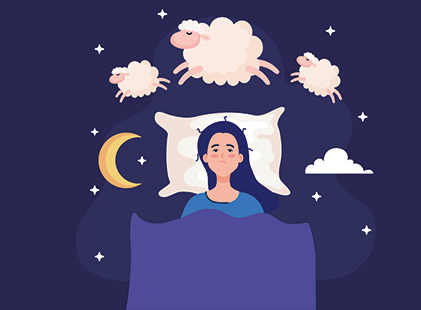CABINET INDIVIDUAL DE PSIHOLOGIE PAP ELENA
servicii psihologice de calitate
10 Natural Methods for Healthy Sleep
10 Natural Methods for Healthy Sleep
4/12/20244 min read


In a busy and challenging world, quality sleep is essential for our health and well-being. Besides our daily routines and habits, certain aspects of our lives can significantly influence the quality of our sleep.
Hormones like serotonin and melatonin play a crucial role in regulating our circadian rhythm and sleep. Serotonin is a neurotransmitter associated with well-being and is the precursor to melatonin, the hormone that induces sleep. Melatonin is released in the brain at night and contributes to regulating sleep-wake cycles. Exposure to natural light during the day helps in the proper production of melatonin at night, thereby improving the quality and duration of sleep.
Sleep deprivation and chronic insomnia can have serious consequences on our physical and mental health. They can lead to:
- Memory and concentration problems: Lack of sleep can affect concentration and memory, allowing mental fatigue to accumulate.
- Stress and irritability: Inadequate sleep can increase stress levels and lead to irritability and anxiety.
- Weakened immunity: Insufficient sleep can weaken the immune system, increasing susceptibility to illnesses and infections.
- Increased risk of chronic diseases: Chronic insomnia is associated with a higher risk of conditions such as obesity, diabetes, and cardiovascular diseases.
Below, discover 10 natural methods to improve sleep quality and enjoy deep, restful sleep.
1. Natural Light
Natural light plays an essential role in regulating the circadian rhythm and melatonin production. Exposure to natural light during the day can help establish a healthy sleep-wake rhythm. Try to spend time outdoors every day, especially in the morning (a 2014 study published in the Journal of Clinical Sleep Medicine showed that adults exposed to more natural light throughout the day experienced significantly improved sleep quality compared to those spending more time indoors).
2. Artificial Light
Avoid excessive exposure to artificial light, especially from phone and computer screens. The blue light emitted by these devices can suppress melatonin production, affecting sleep quality. Use red light filters on screens before bedtime to minimize negative effects on sleep.
According to a 2017 study published in the journal PLOS ONE, exposure to bright artificial light before bedtime can inhibit melatonin production and negatively impact sleep quality. Another study by Harvard University suggests that filtering blue light using specialized glasses can significantly improve sleep quality. Nowadays, phones have a built-in feature that allows you to use the phone on red light, and sleep will improve.
3. Social Networks and Dopamine
Interactions on social networks can stimulate dopamine release in the brain, which can affect the natural sleep rhythm. Limit social media use before bedtime to avoid excessive brain stimulation.
4. Caffeine
Caffeine has a half-life of approximately 5-6 hours. Avoid consuming caffeinated beverages at least 6 hours before bedtime to prevent interference with sleep quality.
5. Physical Exercise
Regular physical exercise can promote restful sleep, but avoid intense exercise before bedtime as it can stimulate the body and hinder the relaxation necessary for sleep.
6. Sleep Schedule
Maintain a consistent bedtime and wake-up schedule, even on non-working days. This helps regulate the circadian rhythm and improves long-term sleep quality.
7. Darkness
Ensure that the bedroom is dark and free from artificial light sources to stimulate melatonin production and create a conducive sleep environment.
8. Temperature
Maintain a comfortable temperature in the bedroom. Extreme temperatures can affect sleep quality. Generally, the ideal sleeping temperature is considered to be between 18 and 22 degrees Celsius (64-72 degrees Fahrenheit).
9. Electrostatic Balance
Electrostatic balance can affect sleep quality. Air out the room before bedtime and ensure there is no excessive accumulation of dust or statically charged particles. Also, consider discharging the static electricity from your body, walk barefoot on grass, earth, on the tile, take a shower, or bath.
10. Alcohol - the Number One Enemy of Quality Sleep
Alcohol consumption can have multiple harmful effects on sleep, even though initially, it may seem to aid relaxation and sleep induction. However, the negative effects can impact sleep quality and duration. Here are some of the harmful effects of alcohol on sleep:
- Suppression of REM (rapid eye movement) sleep: Alcohol consumption can affect how the body enters and remains in the REM phase of sleep. REM sleep is essential for memory consolidation and emotional processing. Alcohol can suppress this important sleep phase, affecting the ability to have restful sleep and feel rested in the morning.
- Sleep fragmentation: Alcohol consumption can lead to sleep fragmentation, meaning you may wake up more frequently during the night and have difficulty reaching deep and restorative sleep stages.
- Slowed breathing rate: Alcohol can affect the breathing rate during sleep, leading to shallow breathing or even sleep apnea in some individuals. These disorders can cause repeated awakenings during the night and poor sleep quality.
- Acid reflux: Alcohol consumption can relax the esophageal muscles, allowing stomach acid to flow back into the esophagus, causing gastroesophageal reflux. This condition can cause discomfort and frequent awakenings during the night.
- Dehydration: Alcohol is a diuretic, meaning it can lead to excessive fluid loss from the body and dehydration. Dehydration can negatively affect sleep quality and lead to nighttime awakenings to use the bathroom.
- Restless, non-REM sleep: While initially inducing sleep, alcohol can negatively affect non-REM sleep stages. This can lead to shallow and restless sleep, where you do not rest effectively.
- Morning effects: Alcohol consumption can result in early morning awakenings and a feeling of fatigue or lethargy in the morning, even if you slept for what seems like a sufficient period.
Bonus: Intimacy
A healthy intimate relationship can contribute to restful sleep. Sexual activity leads to the release of endorphins and oxytocin in the body. Endorphins are known for their calming and stress-reducing effects, preparing the body for better sleep. Oxytocin, also known as the "love hormone," is associated with feelings of bonding and closeness and can promote relaxation and a sense of security, facilitating falling asleep and deep sleep. Sexual activity can reduce cortisol levels in the body, contributing to an overall state of relaxation and preparing you for sleep. Prolactin is another hormone released after orgasm and is associated with relaxation and satisfaction. Increasing prolactin levels can contribute to sleep induction and maintaining a state of relaxation.
By practicing these natural methods to improve sleep, you will be able to enjoy restful sleep and maintain long-term physical and mental health. Remember to consult a healthcare professional if you have persistent insomnia.


